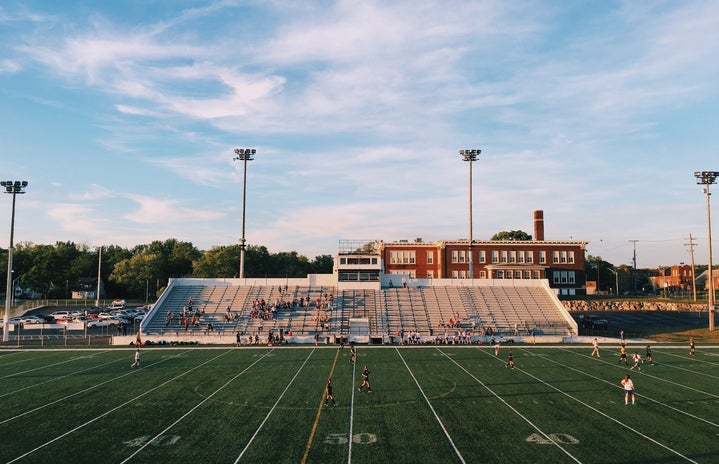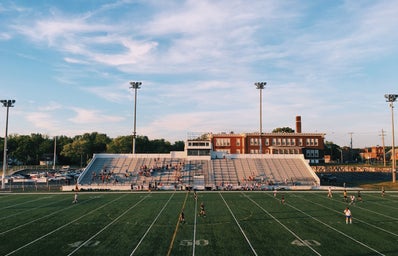Meet Keval, our ambitious NUFC first team goalie who has aspirations of becoming a professional football player and takes a keen interest in seeing more women become involved and excel in the sport.
Name: Keval Patel
Year: Second
Course: Psychology
How long have you been playing football and what drew you to the sport?
I’ve been playing for 10 years now and I think what drew me to it was the fact that it was a team sport that I could play with my friends.
Would you pursue football as a career in the future?
Absolutely! I’d 100% pursue it as a career! It’s something that I love doing. I do it almost every single day of the week and I wouldn’t give it up for anything!
How do you and your team usually celebrate a win?
Normally in the changing room we have this 90’s song that we play. I’m not too sure what it’s called. We listen to that for a good five minutes and sing along to it with all the boys in the changing room. Then I usually go home and celebrate with my house mates with more music and obviously some alcohol. And then after we descend on the watering hole that is Crisis. It’s a very boozy night! A win is usually such a good night and will always end in a drunken mess.
What do you do after a defeat?
Usually I sulk! After we’ve had a dressing down from the manager and have analysed everything that went wrong in the game, we will then try and forgot about it and put it behind us. We go home and just try and forget about everything again through drinking at crisis. Yeah alcohol tends to sooth the pain a bit but generally it’s not a happy time within the team and my mood is usually reflective of that.
Why do the football team always dominate BCL in crisis?
Oh Christ haha! Well it actually used to be dominated by the rugby team to start off with and I think we just kind of eventually took over. I just think there’s a culture within our club for that kind of music and a lot of the boys love grime, garage, hip hop and RnB music. With it being a nice tight knit area it’s just a great place for all of us to congregate. Personally I thinks it’s the best room for you to have the most fun with your mates.
Unfortunately, your varsity game didn’t have the outcome you were hoping for. How did this make you feel and what happened after the match?
I think there was just a general feeling of disappointment within the club and I think within the university as well. I think there were roughly about 5000 people that came to watch the game so we were obviously bitterly disappointed with the result considering we didn’t perform as well as we were expected to. I actually spent the next couple of hours after the game with my parents. I was getting grilled by my dad and then I had my mom comforting me as the baby that I still am after a bad football match haha. But yeah I wasn’t in a good place after that game so the celebration night after varsity wasn’t great either. But hopefully this year we can build on our experiences from last year and we can actually win. A lot of hard work went in last year and the boys did their best, so we couldn’t really ask for anything more.
Being a goal keeper, do you feel like there is a lot of pressure playing that position?
The position itself is pressurised but I don’t feel pressured when playing because overtime you build up a tolerance to particular nerves before a game. So whenever I play a game I don’t really feel nervous anymore. But I do feel a level of responsibility towards my team mates to perform well. There’s just this general feeling that I need to be in control of what’s going on, on the pitch and I think that comes down to my relationship with the other players off the pitch as well. It’s good to have a strong connection with your team mates off the pitch so that performances on the pitch improve.
What made you want to play that position?
To be honest, I bet if you asked any other goalkeeper this question they would not have a clue either. To be a goal keeper you’ve got to be stupid haha. It’s the craziest position on the pitch. I used to play as a striker actually, and the club was full of academy players, so I never actually fully made the team because of it. So my dad suggested that I go in goal because he used to play in goal as well. So I went in goal for a team when I was 9 years old and I just kind of like jumping around in mud and getting kicked in the head. It explains a lot of my personality defects these days!
What are you looking to achieve this year with regards to your own football career?
Personally I’m looking to improve my career outside of the university and try and play the highest level of football that I can. I want to impress people at various football clubs outside the university so that I can heighten my career and my profile and see where it goes from there. Obviously with my degree at the same time it’s difficult. But maybe after my degree there will be opportunities for me to pursue a football career.
What advice would you give to fresher’s who are interested in joining the university team?
It’s a big commitment! A lot of people are under this impression that when you join the football team it’s unlimited popularity, drinking every week and little hard work for a lot of reward. But actually the amount of work that goes in behind the scenes to make the football team possible is phenomenal. Boys are getting up at like 6:30 in the morning and training by 7:00. Obviously if you’re training at those times and playing games during the week you can’t afford to go out drinking the night before. You can’t afford late nights and going on the piss. You need to be in bed at certain hours. So if you are thinking about joining the men’s or women’s football team, make sure you have a desire and a love for the game because it’ll be tested through the amount of hours that you’re training.
Do you feel that the sport effects your university life in any way?
Yeah it definitely does. But it’s not something I’m upset about. It’s really good fun and I really enjoy it. Like I said, you can’t really go out as much as other people. You have to pick and choose your nights so you’re limited socially as well. I couldn’t go out on Mondays and Tuesday’s because I used to have training and a game on Wednesday. You can’t always go out on the weekends either because you may have more games. So socially it does affect you but, there is the added bonus of being part of the football team because it something to be proud of and something to respect. In many ways it can also be good socially because the of the amount of friend and connections you can make within the football club. All of your team mates are in the same position so I guess that does ease the pain of not being able to go out all the time. But I don’t have any regrets about it. And I would recommend it to anybody who wants to get involved in uni life because it does make you feel like part of the university.
What are your views on women’s football?
I think it’s fantastic. The game has been calling out for equality for a long time. Not just in terms of television viewing times but also with regards to wages. I think they’ve taken the right step towards equality in the game by having women’s football televised. The next step now would be equality of pay. Personally I’ve watched quite a bit of women’s football on television and I have to say that the standard is very good! I think until people come to recognise how good women’s football is, only then will it take off and progress into what men’s football is today. I don’t think that people today encourage women to take up sports enough. More women need to stand out and say ‘yeah I would love to play sports and I would love to play football’. Then gradually there will be an increase in attendance with clubs and training sessions. You can’t force someone to play a sport; they have to have a desire to play it and I think when we get to that stage there will be so many more women playing sports.
Great! Thank you for coming along to do this interview. You’ve offered some brilliant advice to those who are looking to join the team and hopefully you’ve inspired more women to get involved with the sport.
Edited by Susan Akyeampong

